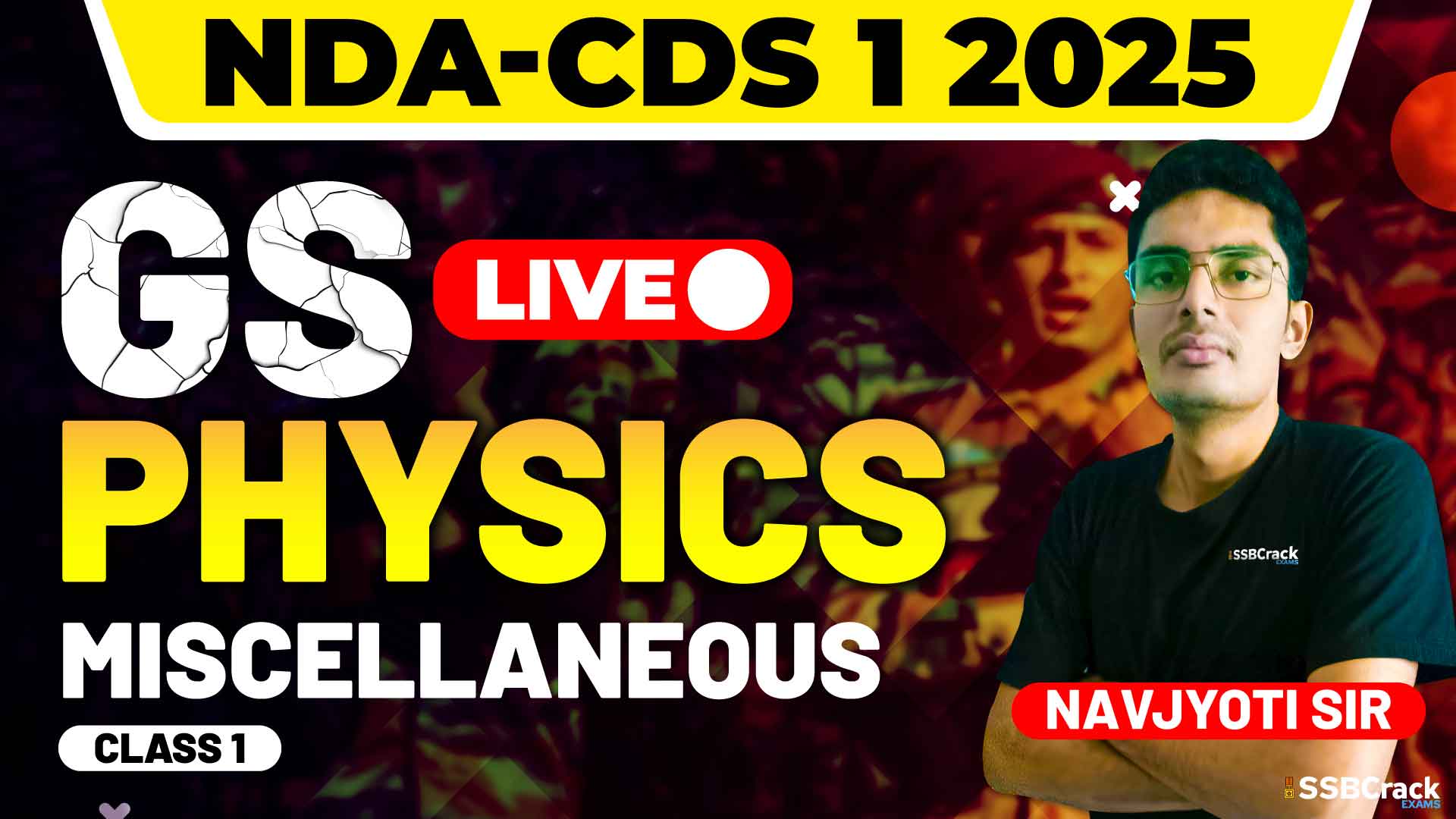The Physics section of competitive exams like the National Defence Academy and Naval Academy (NDA-NA) and the Combined Defence Services (CDS) Exam covers a range of topics that test conceptual clarity and practical understanding. One such topic is Heat Transfer, a significant concept often featured in Paper II of the NDA-NA exam and the General Knowledge (GK) paper of the CDS exam.
A recent class was conducted on Miscellaneous Topics – Heat Transfer, focusing on various subtopics such as heat, conduction, convection, radiation, specific heat, latent heat, evaporation, thermal capacity, and Newton’s law of cooling. The session provided students with an in-depth understanding of these concepts and their practical applications, making it a valuable part of their preparation.
Class Highlights
1. Introduction to Heat and Heat Transfer
- The session began with an overview of the concept of heat as a form of energy and its role in various physical processes.
- The three modes of heat transfer—conduction, convection, and radiation—were discussed in detail, with examples provided to clarify their differences and applications.
2. In-Depth Discussion of Subtopics
Each subtopic was explored comprehensively:
- Conduction: The transfer of heat through direct contact between particles of a substance. Examples like metal rods heating from one end were used to explain the process.
- Convection: The transfer of heat in fluids (liquids and gases) due to the movement of particles. The phenomenon of sea breezes was cited as a practical example.
- Radiation: The transfer of heat without the need for a medium, such as heat from the Sun reaching Earth. The concept of good and bad radiators was also discussed.
- Specific Heat and Thermal Capacity: The ability of substances to absorb heat energy and how it affects temperature changes were covered with relatable examples like water cooling slowly compared to metals.
- Latent Heat and Evaporation: The energy required for phase changes (e.g., ice melting, water evaporating) and the importance of evaporation in daily life were highlighted.
- Newton’s Law of Cooling: Practical scenarios like cooling hot beverages were used to explain this law in simple terms.
3. Application-Based Approach
- The instructor emphasized the practical applications of heat transfer in everyday life and technology, such as refrigeration, heating systems, and thermometers.
- Real-world examples and scenarios made the concepts more relatable and easier to understand.
4. Strategies for Answering Questions
- The instructor provided tips for approaching multiple-choice questions (MCQs) effectively, such as:
- Identifying keywords in the question.
- Eliminating incorrect options through reasoning.
- Using real-life examples to recall concepts quickly.
Strategies for Preparing Heat Transfer for NDA-NA and CDS Exams
Mastering the topic of heat transfer requires a mix of conceptual clarity, application-oriented understanding, and regular practice. Below are some strategies to help you excel in this area:
1. Build a Strong Conceptual Foundation
- Understand the fundamental principles of heat and the three modes of heat transfer.
- Study examples for each mode to differentiate between them clearly.
2. Prioritize Core Topics
Focus on subtopics frequently tested in exams:
- Differences between conduction, convection, and radiation.
- Applications of specific heat and latent heat in real-life situations.
- Concepts related to evaporation and thermal capacity.
3. Use Visual Aids
- Diagrams and flowcharts can help you visualize heat transfer processes.
- Sketch simple illustrations to understand concepts like heat flow in conduction or the movement of fluids in convection.
4. Practice Application-Based Questions
- Solve problems related to real-world applications, such as the cooling of beverages, boiling water, or heat loss in houses.
- Understand how these scenarios are linked to theoretical principles.
5. Solve Previous Years’ Questions
- Go through past exam papers to familiarize yourself with question patterns and frequently asked topics.
- Practice MCQs to improve accuracy and speed.
6. Attempt Mock Tests
- Simulate exam conditions by attempting full-length mock tests.
- Analyze your performance to identify strengths and areas for improvement.
7. Revise Regularly
- Prepare concise notes summarizing the key points of each subtopic.
- Highlight important terms and examples for quick revision before the exam.
8. Clarify Doubts
- Seek clarification for any confusing concepts, either from teachers, textbooks, or online resources.
- Peer discussions can also help reinforce understanding.
9. Stay Consistent
- Dedicate regular study hours to Physics, ensuring consistent progress across topics.
- Set short-term goals for covering specific subtopics and stick to them.
Key Takeaways from the Class
The recent class on Heat Transfer highlighted the importance of understanding the principles and applications of heat and its transfer modes. Through detailed explanations and practical examples, students gained:
- A clear understanding of the core concepts.
- Exposure to real-world applications, enhancing their ability to tackle application-based questions.
- Confidence in solving MCQs through structured reasoning and elimination techniques.
The session also stressed the significance of practicing past questions and maintaining a systematic approach to preparation.
Conclusion
Heat Transfer is a vital topic in the Physics syllabus for the NDA-NA and CDS exams, requiring both conceptual understanding and practical application. The recent class equipped students with the tools and strategies needed to master this subject, from detailed discussions to effective problem-solving techniques.
By following a consistent preparation strategy—focusing on core concepts, practicing diligently, and revising regularly—you can confidently tackle questions from this topic and secure a strong score in the Physics section. Remember, success lies in understanding the subject, applying it practically, and staying persistent in your efforts.
Best of luck with your preparation!







